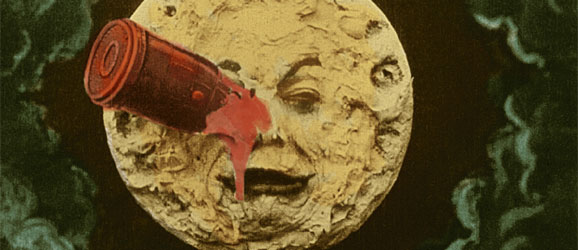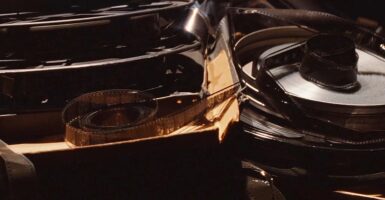New Score For The First Sci-Fi Film, A Trip To The Moon
This article is more than 2 years old
 Long before Transformers, Jedis, or flying saucers on the National Mall, there was Georges Méliès. The French magician-turned-filmmaker was a highly prolific and influential early cinematic figure who harnessed his background in theater and illusions to pioneer special effects on film. He also happens to have created the first science fiction film, A Trip to the Moon (Le voyage dans la lune)“. The 1902 short silent film is loosely based on works by Jules Verne and H.G. Wells and tells the story of a turn of the century trip to the moon via rocket.
Long before Transformers, Jedis, or flying saucers on the National Mall, there was Georges Méliès. The French magician-turned-filmmaker was a highly prolific and influential early cinematic figure who harnessed his background in theater and illusions to pioneer special effects on film. He also happens to have created the first science fiction film, A Trip to the Moon (Le voyage dans la lune)“. The 1902 short silent film is loosely based on works by Jules Verne and H.G. Wells and tells the story of a turn of the century trip to the moon via rocket.
Although it was made over a century ago, A Trip to the Moon remains highly iconic and influential. So iconic, in fact, that this year’s Cannes Film Festival opened with a newly restored (color!) version of the film with a new score by the French electronic duo Air. The hand-painted color version of “A Trip to the Moon” was long thought lost before a badly damaged print was discovered in 1993, and now digital technology allowed Lobster Films, Groupama Gan Foundation for Cinema and the Technicolor Foundation for Cinema Heritage to reassemble all the little fragments into a complete version. Here’s a brief clip from the new restoration with the score:
It looks like they did a beautiful job with the restoration.
Air is the duo behind the score for The Virgin Suicides (and central songs from other Sofia Coppola films) and might seems weird pick to do the music for a silent film. From what the little clip shows, though, it seems to have paid off. Most of track has a little more of an epic feel to it than you find in most other scores for the sequence. It returns to a bit of an odd techno vibe toward the end, but it will definitely be interesting to see how Air handled the whole film.
Odds are there won’t be a re-release of the new restoration with Air’s score, but an expanded version of the music is being released as an album by AstralWerks in February. Indiewire has a track list up for those interested.












